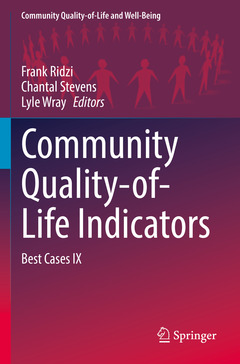Description
Community Quality-of-Life Indicators, 1st ed. 2022
Best Cases IX
Community Quality-of-Life and Well-Being Series
Coordinators: Ridzi Frank, Stevens Chantal, Wray Lyle
Language: English
Subjects for Community Quality-of-Life Indicators:
Publication date: 08-2023
234 p. · 15.5x23.5 cm · Paperback
Publication date: 08-2022
234 p. · 15.5x23.5 cm · Hardback
Description
/li>Contents
/li>Biography
/li>Comment
/li>
1.1 Noel Keough, Sustainable Calgary State of Our City Reporting: Pathways to a More Sustainable, Just and Resilient City
1.2 Donald Matteson & Tracy Sawicki, We Can’t Fix What We Don’t Know is Wrong: Developing Community Indicators for Often-Ignored Populations1.3 Bijan Kimiagar, The most important voices are the ones we hear from the least: Community-based assessments in collaboration with families and community-based organizations
1.4 Terry S Atkinson & Kimberly L. Anderson, From Idea to Reality: Creating and Implementing an Early Literacy Action Plan With Community Partners
Part II: Resilience Planning
2.1 Patrick Brixler, Community Resilience in Austin, Texas: Measuring social vulnerability and multi-hazard exposure to drive collective action
2.2 Lubaina Rangwala, Data-led Resilience Planning for Localised Action
2.3 Susie Maloney, Beyond a ‘tick-box approach’ for local government climate change adaptation: Learning through doing with M&E
2.4 Meghan Gabil, The Cost of Sea Level Rise for Vinalhaven, ME: Spurring Action through Collaborative Data Analysis
Part III: Aligning Community Indicators with Professional Standards
3.1 Patsy Kraeger, Rhonda Phillips and Frank Ridzi, The Community Foundation - Community Indicator Interface: Exploring Connections and Applications
3.2 Peg Thomas, Advancing SDG-Strategy 8.B.1 by Developing and Measuring the Impact of a Specific Youth Workforce Development Model Called Earn and Learn
Frank Ridzi is Vice President for Community Investment at the Central New York Community Foundation, Associate Professor of Sociology at Le Moyne College, former President of the Community Indicators Consortium Board and past President of the Literacy Funders Network, an affinity group of the Council on Foundations. He has helped to launch and lead community initiatives in areas such as increasing community literacy, reducing lead poisoning and addressing poverty and economic inclusion. He has been involved in launching Community Indicators efforts and has conducted research and written in the areas of collective impact, sociology of work, social policy and student affairs. His writings have appeared in such places as the Foundation Review, the Journal of Applied Social Sciences, the Journal of Organizational Change Management, and Review of Policy Research. Frank is the 2021 Winner of the Society for the Study of Social Problems Dorothy E. Smith Scholar-Activist Award.
Frank holds a Masters Degree in Public Administration and a Ph.D. in Sociology from Syracuse University’s Maxwell School. He also carries a Certificate of Advanced Study in Women’s Studies. Prior to joining the Community Foundation, he served as Director for the Center of Urban and Regional Applied Research at Le Moyne College, where he still serves as Associate Professor and Department Chair of Sociology.Includes timely research on cutting-edge practices in community well-being
Builds on the accumulating expertise of the Community Indicators Consortium.
Encapsulates key learnings from the field as best cases




